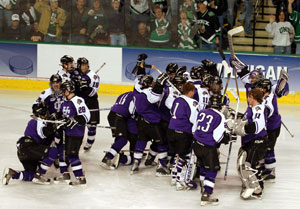For the Minnesota Golden Gophers, it hadn’t really sunk in yet. A few minutes simply weren’t enough to digest one of the most stunning upsets in the history of college hockey.
“It’s just a blank,” said captain Gino Guyer after the Crusaders’ 4-3 overtime win Friday at Ralph Engelstad Arena knocked the Gophers out of the NCAA tournament. “I can’t even describe it.”
The Holy Cross players, though, were at no loss for words after their historic victory, the first for Atlantic Hockey or its predecessor, the MAAC Hockey League, in the NCAA tournament.

“We were pretty much aware of the fact that we weren’t supposed to win,” added Tyler McGregor, whose second goal of the game — his team-best 26th of the season — won it in OT. “We weren’t cocky by any means, but we were confident.”
Holy Cross, making its second appearance in the NCAAs, played North Dakota well in a 3-0 loss back in 2004, but brought a different attitude this season.
“Tonight, coming in a second time [to the NCAAs], we knew what to expect,” said netminder Tony Quesada, the Crusaders’ career leader in just about every meaningful statistical category.
“Last time [in 2004], it was kind of a Super Bowl for us with all the media and the attention. This year we came in with the intention of winning the game, and I think we proved tonight that we are capable of that.”
Prove it they did. The anatomy of the Holy Cross victory was not that of a fluke, the sort of contest in which a superhuman goaltender makes a mountain of impossible saves, and his team wins a 1-0 decision despite having a total of eight shots on net, thanks to a puck that bounces in off a defenseman’s skate.
No, the Crusaders earned this one on the ice, despite being outskated and outshot for meaningful stretches. Quesada made 35 saves, a respectable but not shocking number, and afterward was surprised he didn’t see more tough shots.
“I feel like I didn’t have the best game, or that I was challenged as much as I expected coming into tonight,” he said.
You could have fooled the Gophers. Senior defenseman Chris Harrington — who like Guyer saw his collegiate career end unexpectedly Friday night — laid the credit for the win squarely at Quesada’s feet, calling the Crusader netminder’s effort “one of the best goalie performances I’ve seen in a while.”
Would the Crusaders win if they played the Gophers again 24 hours later? Maybe, maybe not. But that’s irrelevant. What matters is that a hurdle has been cleared, a ceiling breached.
Holy Cross head coach Paul Pearl, who has made clear his disinterest in potential Cinderella designations, was reluctant to put a label on the win.
“My history is probably not as good as it should be,” Pearl mused, before cautiously adding, “Since they went to the 16-team format [for the tournament], I’d say it would rank as one of the bigger upsets.”
Maybe a little bigger than just that. When ranking the magnitude of Holy Cross’ accomplishment, the immediate comparison that springs to mind is Niagara’s 1999-2000 upset of New Hampshire in the first round of what was then a 12-team tournament.
But that year’s edition of the Purple Eagles were a team in its fourth year as a varsity squad, graduating a huge, talented senior class — its first senior class — that had already beaten the likes of Boston University, Cornell and Colorado College that season.
The fact that the CHA has not since produced a team to match Niagara’s startling success that year attests to the notion that the 1999-2000 Purple Eagles were a supremely impressive anomaly, rather than a harbinger of things to come.
But this year’s version of the Crusaders is a different animal. Atlantic Hockey made strides once again in 2005-06 in terms of competitiveness outside the conference, and Holy Cross led the charge with wins over Rensselaer, Dartmouth and Massachusetts.
Translated: the Crusaders are the true product of the development of their league, the offspring of improvement that continues to take Atlantic Hockey down the road to respect.
Minnesota head coach Don Lucia led Alaska-Fairbanks during its final season in the defunct Great West Hockey Conference, and during their intermission as an independent before joining the CCHA. As such, he is a frequent advocate for the continued development of college hockey’s nascent leagues.
Lucia, therefore, framed the Crusaders’ win in a broader context.
“It’s obviously disappointing for us,” he said, “but the bottom line is that their win is good for college hockey. These [newer] teams, these leagues are getting better.”


